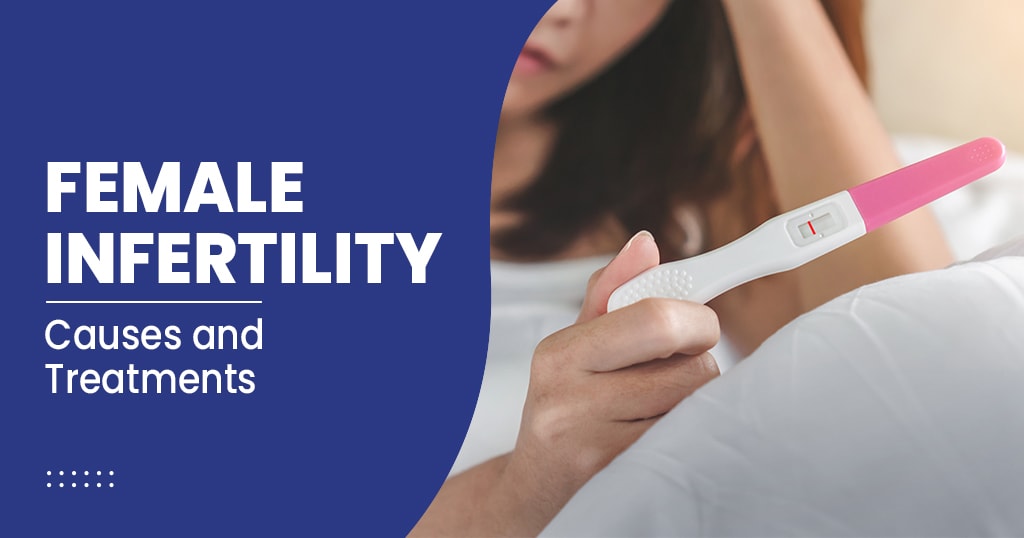Infertility in Women: Causes, Symptoms, and Treatments
Read on to learn about the causes, symptoms, and treatments for this condition.

Introduction
Infertility in women is a medical condition that affects a woman's ability to conceive a child. It can be caused by a variety of factors, including hormonal imbalances, structural issues in the reproductive system, and lifestyle factors. Infertility can be a challenging and emotional condition to deal with, and it can impact every aspect of a woman's life. In this article, we will explore the causes, symptoms, and treatments for infertility in women, so you can better understand this condition and find the help you need.
Understanding infertility in women
Infertility in women is defined as the inability to conceive after 12 months of regular, unprotected sexual intercourse. This condition affects approximately 10–15% of couples worldwide, and it can be caused by a variety of factors.
Causes of Infertility in Women
There are many potential causes of infertility in women, including:
Hormonal imbalances: An imbalance in hormones such as estrogen and progesterone can disrupt ovulation and make it difficult for a woman to conceive.
Structural issues: structural issues in the reproductive system, such as blocked fallopian tubes or uterine fibroids, can prevent the fertilization of the egg.
Age: As a woman ages, her fertility decreases, and the risk of infertility increases.
Lifestyle factors: Certain lifestyle factors, such as smoking, excessive alcohol consumption, and being overweight or underweight, can negatively impact a woman's fertility.
Medical conditions: Medical conditions such as endometriosis, polycystic ovary syndrome (PCOS), and pelvic inflammatory disease (PID) can affect a woman's ability to conceive.
Environmental factors: Exposure to toxins, such as pesticides or lead, can also impact a woman's fertility.
Symptoms of Infertility in Women
The most common symptom of infertility in women is the inability to conceive a child after 12 months of regular, unprotected sexual intercourse. However, there are other symptoms that may indicate a problem with a woman's reproductive system, including:
Irregular menstrual cycles
Painful periods
Heavy bleeding during periods
Pain during intercourse
Abnormal vaginal discharge
If you are experiencing any of these symptoms, it is important to speak with your doctor to determine the cause and find appropriate treatment.
Diagnosing Infertility in Women
If you have been trying to conceive for 12 months or longer without success, you may be diagnosed with infertility. Your doctor will perform a thorough physical exam and may order tests such as blood work, ultrasounds, or a hysterosalpingogram (HSG) to determine the cause of your infertility.
Treatment Options for Infertility in Women
There are several treatment options available for infertility in women, depending on the cause and severity of the condition. These may include:
Lifestyle Changes
Making lifestyle changes such as quitting smoking, reducing alcohol consumption, and maintaining a healthy weight can improve a woman's fertility and increase her chances of conceiving.
Medications
Certain medications can help regulate hormone levels and stimulate ovulation, increasing a woman's chances of conceiving.
Assisted Reproductive Technologies (ART)
Assisted reproductive technologies (ART) such as in vitro fertilization (IVF), intracytoplasmic sperm injection (ICSI), and gamete intrafallopian transfer (GIFT) can help couples conceive by bypassing certain fertility barriers. These procedures involve fertilizing an egg outside of the body and implanting it in the uterus.
Surgery
Surgery may be necessary to correct structural issues in the reproductive system, such as blocked fallopian tubes or uterine fibroids.
Donor eggs or sperm
In cases where a woman's own eggs or a man's sperm are not viable, donor eggs or sperm may be used for fertilization.
Surrogacy
Surrogacy involves using a surrogate to carry a fertilized embryo to term. This option is often considered in cases where a woman is unable to carry a pregnancy to term due to medical issues.
It is important to note that treatment options for infertility in women can be expensive and may not be covered by insurance. It is essential to discuss the costs and potential success rates of each treatment option with your doctor before making a decision.
FAQs About Infertility in Women
1. Can infertility in women be prevented?
In some cases, infertility in women can be prevented by maintaining a healthy lifestyle, avoiding exposure to toxins, and treating any underlying medical conditions that may affect fertility. However, some causes of infertility cannot be prevented.
2. When should I see a doctor if I am experiencing infertility?
If you have been trying to conceive for 12 months or longer without success, it is important to speak with your doctor to determine the cause of your infertility and find appropriate treatment.
3. Can infertility in women be cured?
The cure for infertility in women depends on the cause and severity of the condition. In some cases, infertility can be cured through lifestyle changes or medical treatments. In other cases, assisted reproductive technologies or surrogacy may be necessary.
4. Are there any risks associated with infertility treatments?
Some infertility treatments, such as in vitro fertilization, may increase the risk of multiple pregnancies, premature birth, and low birth weight. It is important to discuss the potential risks and benefits of each treatment option with your doctor before making a decision.
5. Can stress cause infertility in women?
While stress can negatively impact a woman's overall health, there is no evidence that it directly causes infertility.
6. What can I do to improve my chances of getting pregnant?
Maintaining a healthy lifestyle, tracking ovulation, and having regular sexual intercourse during your fertile window can all improve your chances of getting pregnant.
Conclusion
Infertility in women can be a challenging and emotional condition to deal with, but there are many treatment options available. By understanding the causes, symptoms, and treatments for infertility in women, you can take proactive steps to improve your fertility and increase your chances of conceiving. Remember, if you are struggling with infertility, you are not alone, and there is help available.
About the Creator
VitalityVibe
Welcome to VitalityVibe, your ultimate resource for unlocking your health potential and embracing a vibrant life. Our platform is designed to inspire and guide you on your journey to holistic well-being.






Comments
There are no comments for this story
Be the first to respond and start the conversation.